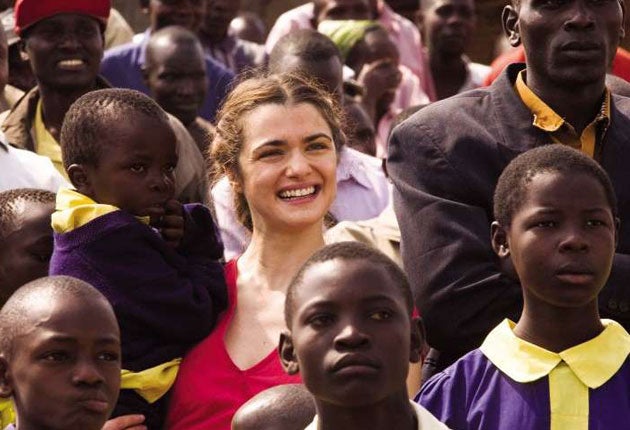Pfizer to pay £50m after deaths of Nigerian children in drug trial experiment
Out of court settlement in the case that inspired 'The Constant Gardener'

A divorce case was all that passed for excitement at Richard P Altschuler's "kinda small" lawyer's office in West Haven, Connecticut, when the phone rang nine years ago. On the other end of the line, a world away in the heat of Nigeria, was Etigwe Uwo, a young lawyer with "an incredible story about Pfizer". The Lagos attorney was going to take on the largest pharmaceutical company in the world in an unprecedented class action pitting African parents against an American corporate giant. And he needed help.
Mr Etigwe had chosen Mr Altschuler because, back in 1979, the Connecticut lawyer had successfully defended a friend of the Nigerian. The unlikely pair were about to embark on a marathon journey into the world of "big pharma". Nine years on and their efforts have finally been rewarded with a reported $75m (£50m) settlement, the terms of which are likely to be released this week.
If it sounds like the script of a Hollywood blockbuster that's because it was this story that prompted John Le Carre to write The Constant Gardener, according to Mr Altschuler.
In real life it was to Nigeria, not Kenya, that Pfizer turned. In 1996, the company needed a human trial for what it hoped would be a pharmaceutical "blockbuster", a broad spectrum antibiotic that could be taken in tablet form. The US-based company sent a team of its doctors into the Nigerian slum city of Kano in the midst of an appaling meningitis epidemic to perform what it calls a "humanitarian mission". However the accusers claim it was an unlicensed medical trial on critically-ill children.
A team of Pfizer doctors reached the Nigerian camp just as the outbreak, which killed at least 11,000 people, was peaking. They set themselves up within metres of a medical station run by the aid group Médecins Sans Frontières, which was dispensing proven treatments to ease the epidemic.
From the crowd that had gathered at the Kano Infectious Diseases Hospital, 200 sick children were picked. Half were given doses of the experimental Pfizer drug called Trovan and the others were treated with a proven antibiotic from a rival company.
Eleven of the children died and many more, it is alleged, later suffered serious side-effects ranging from organ failure to brain damage. But with meningitis, cholera and measles still raging and crowds still queueing at the fence of the camp, the Pfizer team packed up after two weeks and left.
That would probably have been an end to the story if it weren't for Pfizer employee, Juan Walterspiel. About 18 months after the medical trial he wrote a letter to the then chief executive of the company, William Steere, saying that the trial had "violated ethical rules". Mr Walterspiel was fired a day later for reasons "unrelated" to the letter, insists Pfizer.
The company claims only five children died after taking Trovan and six died after receiving injections of the certified drug Rocephin. The pharmaceutical giant says it was the meningitis that harmed the children and not their drug trial. But did the parents know that they were offering their children up for an experimental medical trial?
"No," Nigerian parent Malam Musa Zango said. He claims his son Sumaila, who was then 12 years old, was left deaf and mute after taking part in the trial. But Pfizer has denied this and says consent had been given by the Nigerian state and the families of those treated. It produced a letter of permission from a Kano ethics committee. The letter turned out to have been backdated and the committee set up a year after the original medical trial.
At stake at one point last year was more than $8bn in punitive damages being sought in a string of cases, as well as potential jail terms in Nigeria for several Pfizer staff. "There has been a complex web of cases with proceedings in Connecticut, New York, Lagos, Abuja and Kano," Mr Etigwe said. "The strategy of big companies when they are dealing with smaller opponents is to stretch the process, to overwhelm us until we are ready to accept whatever they want to offer." Trovan never became the blockbuster that Pfizer had hoped for and it is no longer in production. The EU has banned the drug and it has been withdrawn from sale in the US.
It appears that Pfizer has finally ended the public relations nightmare with Friday's settlement. But the Trovan battle may not be over yet.
At the end of January 2009, a New York appeal court ruled Mr Etigwe and Mr Altschuler's case could be heard in the US. The Connecticut attorney says it could still go ahead. "Our case is firmly embedded in the US ... so a Nigerian settlement does not foreclose our case. But this is very good news. I'm glad we remained the constant gardener and could see this come to fruition."
Join our commenting forum
Join thought-provoking conversations, follow other Independent readers and see their replies
Comments
Bookmark popover
Removed from bookmarks